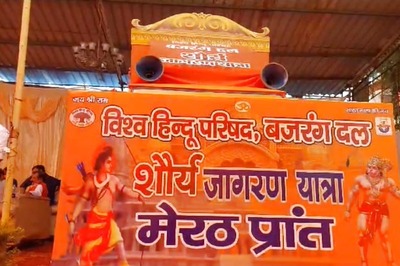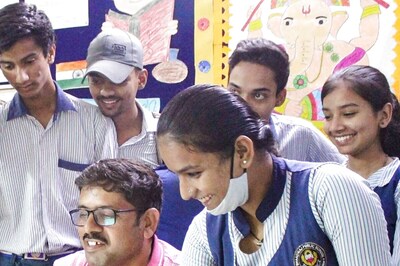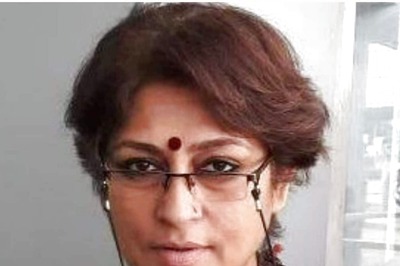
views
The BJP was steadfast in its support for Israel, comparing the Hamas attack to the 26/11 Mumbai terror attack while the Congress has been carefully silent on Hamas and extending solidarity with the Palestinian cause.
Prime Minister Narendra Modi’s ‘firm support’ to Israeli PM Benjamin Netanyahu while calling a spade a spade made most draw the conclusion that his and BJP’s stand on Israel is guided by domestic politics where the Congress is allegedly appeasing Muslims while the saffron party is taking a nationalistic stand.
However, the truth is far more complex. The view of Modi — himself a product of the RSS — is guided by the ideology of MS Golwalkar who was popularly known as ‘Guruji’ and was the second RSS chief as well as the views of Deen Dayal Upadhyaya — the co-founder of Jan Sangh that later became the BJP as we know it today. It’s thus an ideological standpoint for Narendra Modi than narrow political goals.
RSS, SAVARKAR ON ISRAEL
Golwalkar, the second Sarsanghchalak of the RSS — BJP’s ideological mentor — had a very radical view about Israel for pre-Independent India. For Jews of 1930, Golwalkar said: “The reconstruction of the Hebrew Nation in Palestine is just an affirmation of the fact that Country, Race, Religion, Culture, and Language must exist unavoidably together to form a full Nation idea.”
Remember, this was said when Israel was not even founded. On May 14, 1948, David Ben-Gurion, the head of the Jewish Agency, proclaimed the establishment of Israel in accordance with the UN plan of partition of Palestine into separate Jewish and Arab states.
So for the RSS to have such a strong view in those times when only Jews shared their sentiments was bold, to put it mildly. Many argue he had a similar vision for India — still British-occupied — when he talked about the Jewish nation.
Veer Savarkar, known to be the father of ‘Hindutva’ as we know it today, had a much clearer understanding of Israel which is not just based on ‘civilisation’ as argued by Golwalkar but more on the nation-state of Israel — a modern outlook.
He also found a common thread between Jews and India. While talking about India as a ‘holy land’, Savarkar had said: “No people in the world can more justly claim to get recognised as a racial unit than the Hindus and perhaps the Jews.”
As BJP supporters flood X (formerly Twitter) with hashtags like ‘India with Israel’ and the flag emojis of the two nations, deep down it has a lot to do with Savarkar’s view. Modi’s clarity of thought — when he said “people of India stand firmly with Israel in this difficult hour. India strongly and unequivocally condemns terrorism in all its forms and manifestations” — has its roots in Golwalkar’s and Savarkar’s long-standing ideological vies.
DEEN DAYAL UPADHYAYA ON ISRAEL
Upadhyaya, an RSS member and co-founder of Jan Sangh, penned a book ‘Integral Humanism’ which was drafted as a political programme and adopted in 1965 as the official doctrine of the Jan Sangh and later BJP. The BJP still considers it as its political doctrine. He wrote his views about Jews and Israel in that book as well.
“Israeli Jews lived for centuries with other peoples scattered far and wide, yet they did not get annihilated in the societies in which they lived,” he wrote, stressing the invincibility of the Jewish race. He further wrote, “When a group of persons lives with a goal, an ideal, a mission, and looks upon a particular piece of land as motherland, this group constitutes a nation.” For the modern BJP, Israel’s Jews tick all these boxes.
Former BJP general secretary Ram Madhav, who during his tenure spearheaded the foreign policy aspect for the BJP, wrote in his book ‘Hindutva Paradigm’: “In Deen Dayal’s opinion, [Dharma] formed the basis for India’s national identity.” Madhav elaborated that ‘Dharma’ here doesn’t suggest ‘religion’ but ‘value system’. And in that sense, Upadhyaya brought two ancient races — Hindus as inhabitants of the Sindhu land and Jews together.
Today’s manifestation of unprecedented solidarity from Indians — not only in India but across the globe — for Israelis comes from Upadhyaya’s connect.
In an interview, while appreciating the support of India and Modi, Israeli Ambassador to India Naor Gilon remarked that so many Indians volunteered to assist Israel that the latter could almost form another unit of the Israel Defence Force (IDF). A cursory look on social media would tell you that this barrage of generic support in India has come mostly from those who are supporters of the BJP.
When Madhav deciphers Upadhyaya’s stand as ‘Dharma’ in his own book, he isn’t factually wrong. Late Israeli president Shimon Peres claims in his book ‘No Room for Small Dreams’ that “the Jewish people have lived by the guiding principle of tikkun olam — the ambition to improve the whole world, not just ourselves”. ‘Tikkun Olam’ is to Israel what ‘Dharma’ is to India.
It shouldn’t come as a surprise to anybody that if any political outfit in India resonates with Israel’s sentiments, it’s the BJP.
No wonder, the first major Indian political figure to visit Israel was BJP leader LK Advani. He had brought several senior security officials from the Home Ministry with him on his June 2000 trip. Even Jaswant Singh, his counterpart in the Foreign Ministry, made a trip to Israel. During the time of the Atal Bihari Vajpayee government, the two countries established a joint counter-terrorism commission. With Narendra Modi — a two-term prime minister with the highest approval ratings — at the helm, India and Israel have never been closer. PM Modi calling Netanyahu “my friend Bibi” shows the comfort in the relationship.
If anyone should be credited for this comfort, it should be the ideological forefathers of the BJP.




















Comments
0 comment